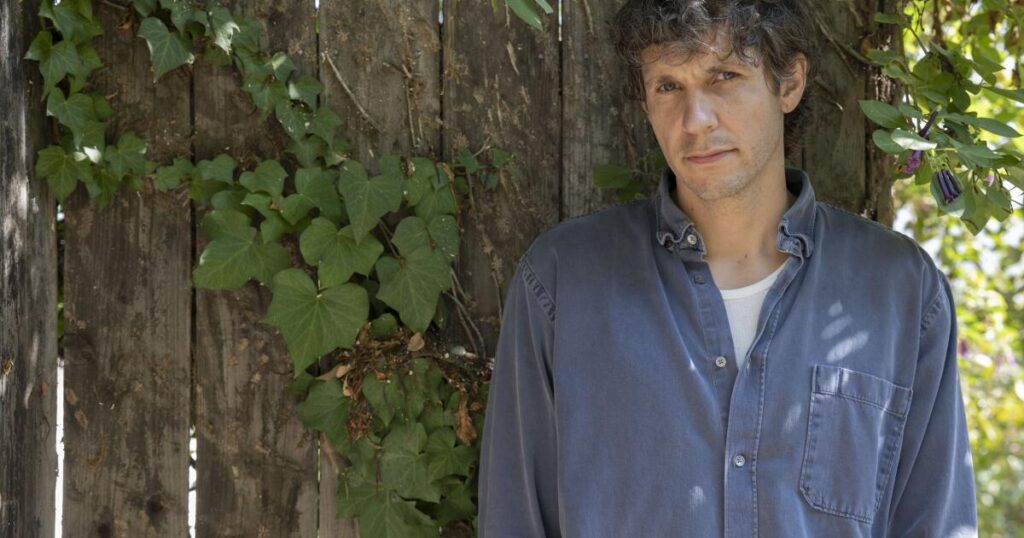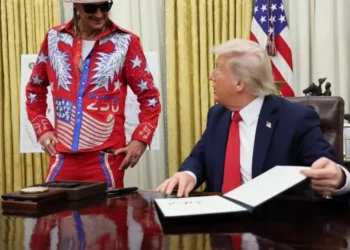To get it out of the way: Yes, Tobias Jesso Jr. has heard about gooning.
“Somebody put me up on it and said it was about masturbation?” says the 40-year-old singer and songwriter, which is about half-right: As detailed in an essay in Harper’s that went viral last month, to goon — a term heretofore associated with Jesso thanks to his cult-fave 2015 album “Goon” — means in Gen Z parlance to masturbate at such great lengths that the act leads to a kind of trance state.
“Well, I’ve never done that,” Jesso says. “‘Goon’ I got from ‘The Goonies’ — it’s just a brilliant movie.” He laughs. “But I don’t care. If it sells more records, sure.”
That Jesso has a record to sell at all might take some by surprise. Though “Goon” thoroughly charmed critics and fellow musicians with its early-’70s-balladeer vibe — many said he evoked the glory days of Randy Newman, Harry Nilsson and beard-and-shearling-coat-era Paul McCartney — Jesso didn’t cotton to the life of a sort-of-famous performer and almost immediately walked away from his solo career to write songs for other singers instead.
He’s thrived in that role, penning hits for the likes of Adele, Niall Horan, Harry Styles and Dua Lipa. In 2023, he was named songwriter of the year at the Grammy Awards; this month he was nominated for that prize for a second time, with the Recording Academy citing his work with Justin Bieber (“Daisies”), Haim (“Relationships”) and Olivia Dean (“Man I Need”), among others.
Yet now he’s back with an unexpected follow-up to his debut called “Shine,” which came out Friday. Stripped back for the most part to just voice and piano, it’s an earnest work of introspection from a guy who knows how to make tenderness feel like strength.
Jesso, who grew up in Vancouver and lives in Los Angeles, announced the album just last week with a music video for his song “I Love You” that features the actors Riley Keough and Dakota Johnson, with whom he’s been close since he first touched down here around 2008.
“I hit them up and was like, ‘You girls think it’s about time I use your fame to get some extra clicks?’” he says on a recent morning at his place in Silver Lake. “The video opens up on them, then it pans away and it goes to me and you never see them again.”
Says Keough, a former girlfriend: “It was a very Tobias ask.”
So why return to the spotlight? According to Jesso, he wouldn’t have had it not been for a breakup that left him “the most depressed I’ve ever been in my life, by far.” We’re sitting in a cozy den that looks out over a lush hillside garden; a bowl of persimmons sits on a coffee table while a copy of “McCartney II” peeks out from a stack of LPs.
Jesso, whose mop of curly hair has begun ever so slightly to gray, says that when he enters a songwriting session with another artist, “I leave my worries and woes outside the door. I’m there to serve you — to write the song you want to write.” It’s an approach that’s endeared him to his star collaborators and yielded songs as deep as Adele’s “To Be Loved,” a stunning meditation on the costs of divorce from her 2021 album “30.”
But earlier this year, for the first time in Jesso’s decade of behind-the-scenes work, he found himself struggling to deliver. “I was feeling so in the dumps that I’d be choking on a line that I didn’t even want to say because if I say it, I’ll start crying,” he recalls.
He cleared six weeks from his busy schedule to process his emotions; the result was a set of songs for himself about heartache — “I can see the love leaving from your eyes in the form of a tear,” he sings in “Rain” — but also about his mom’s experience with dementia and about the young son he shares with his ex-wife.
To record the music, Jesso’s instinct was to go big. “I’m a dreamer, so I was like, ‘Imagine all the people I could have help me now that I didn’t have 10 years ago,’” he says. “I went from so-and-so to so-and-so, trying out studios, making promises I couldn’t keep. But all that stuff over the weeks just kind of flaked away.”
What remained was the beautifully mellow sound of a vintage Steinway piano he’d had restored after buying it on Craiglist for $800. He keeps the piano in a small, uncluttered studio upstairs from the den at his house; that’s where he cut “Shine,” singing live as he accompanied himself in real time.
A small handful of other players appear on the album, most prominently in “I Love You,” which erupts near the end with a wild drum fill performed by Jesso’s old pal Kane Ritchotte. The idea for the percussive outburst came to Jesso after he’d consumed “a s— ton of mushrooms,” he says. “I turned to my assistant at the time — I wonder if I have it — and I said, ‘Record me right now.’ She started recording me, and what came out was that fill.”
He picks up his phone and scrolls for a moment. “Look at this,” he says, turning the screen my way: There’s Jesso in the same room we’re in right now, staring wide-eyed into the camera as he mouths the drum sounds Ritchotte would later replicate exactly.
“That song is about somebody’s inner child being in the middle of a labyrinth, and you’re trying to find them so you can convince them that you’re in love,” Jesso tells me. “You can’t get there and you’re wishing that the whole labyrinth would just be destroyed. So when it gets to that part — ‘Shatter the cracks wide open / And say, “I love you”’ — the drums are the walls coming down. That’s the shattering.”
Drum theatrics aside, Jesso’s singing is the album’s clear focal point; his pleading, slightly unsteady tone gives the music an emotional intimacy that makes you feel as though you’re sitting right next to him on the piano bench.
Jesso describes his voice as something of a liability, which Keough says has been true since he was ducking the frontman’s job in the various bands he played in when he was in his early 20s. “I always loved his voice, and he just didn’t feel that way for whatever reason,” she recalls. “I don’t know if he felt a sort of shyness, which is really interesting because as a person he’s not shy whatsoever.”
Asked whether Jesso’s decision to follow up “Goon” surprised her, she says, “I was surprised he released ‘Goon’ to begin with.”
The way Jesso sees it, “My voice isn’t good enough for the songs I write, which is why I’ve chosen to work with all these other people.” What he’s comes to realize, though, is that “my voice is perfect for my songs.”
Which doesn’t mean it’s easy for him to hear it. Once he’d finished recording, Jesso asked his friend Shawn Everett to mix “Shine”; what he got back — with every imperfection of his voice under a virtual magnifying glass — terrified him. “It felt way, way, way too vulnerable,” Jesso says.
He texted Everett and said he was sorry but that he couldn’t put out the record like this. “I told him, ‘You just brought out more of me than I’m willing to share,’” he says now. “Then I got home, I smoked a big fat joint and I sat on the couch. I was like, I’m gonna wait until I’m high enough that I can press play and pretend this isn’t me.” He laughs. “I put on the headphones, and I have never in my life had such a profound experience with music.”
Who’d you imagine was singing?
I don’t know — like a 50-year-old dude or maybe a 20-year-old girl who’s got a low voice? It didn’t matter — it wasn’t me, so I wasn’t listening with judgmental ears.
The paradox is that “Shine” feels like the you-est possible album.
There’s no tricks. I didn’t auto-tune, I didn’t cut anything together, I didn’t do any of that. It’s me singing a take, and it’s the best take I got. Whereas with “Goon,” there were a lot of elements that maybe weren’t possible for me to do.
“Goon” was a little more elaborate — more players and producers.
Which was tortuous because I’m like, “How do I recreate this thing that I didn’t even fully make myself?”
Given the unhappiness of your experience after “Goon” came out, I wondered whether this time you’d put certain restrictions on what you’re willing to do.
I’ll say right off the bat: I’m not touring — no way. I’ve met enough artists who say, “I feel totally myself onstage,” to know that there’s a natural state in which people feel comfortable up there. And I’ve tried every which way — by which I mean drinking and not drinking — and I just can’t. It’s not me.
Maybe this is something I still need to work on in therapy, but by being onstage and singing, I’m basically saying, “I’m a singer,” and I’m not comfortable saying that. I’m comfortable saying, “I’m a songwriter.” So there’s this weird shame that comes in where I’m presenting myself beyond what I know my ability to be.
One of the benchmarks I needed to hit on this record was to be comfortable that I’m not misrepresenting myself, which is why I’m OK if there’s an out-of-tune note here and there or if it’s a little bit fast or slow. But even knowing that I can perform it exactly like it is on the record, there’s nothing drawing me to the stage. I don’t really want to have a relationship with fans in that way. I feel very privileged that this is not my main job.
Between “Goon” and now, songwriting became your main job.
So I don’t have to take this as seriously. The parts I do take seriously — the art — I’m willing to put in the work for.
But not for success per se.
Exactly. This is weird to say, but there were moments where I was toiling over this record — listening to Take No. 73 and being like, “Wait, what was the other one?” — and the thought would occur to me: I could go to work today instead of do this and potentially create much more wealth for myself than this album could ever do.
I mean, that’s almost certainly the case.
In comparison, “Shine” is meaningless in terms of success and potential. And yet I was still drawn to doing it, which made me feel like I was making the right choice for myself. But when it comes to the stuff I don’t think is important, just try to get me to do it. It ain’t happening.
I went back and looked at something I wrote about a show you played at South by Southwest in 2015 where you had to start your song “True Love” five times.
Oh God.
But it’s not like anybody in the crowd was mad about it. People thought it was cute.
I feel like if I was onstage now — and everything’s pointing to I probably should play a show or two — I’d be able to see the value in vulnerability. It’s human, and I like that about it. But at the time I wasn’t able to cope with the people who wouldn’t see it that way. Because I wasn’t seeing it that way. I was seeing it as: I’m trying to pretend I’m OK with this, but I’m actually forgetting my song because I’m such a s— performer. Yeah, the crowd loves it, but I go offstage and I’m not looking for the comments saying, “It was so funny.” I’m looking for the ones that are like, “This guy’s a joke.” And I’m like, f—, I knew it.
Keough shares Jesso’s assessment of what’s put him in a different position today versus 10 years ago.
“With ‘Goon,’ he would have put pressure on himself” to jump through the hoops required of a performer, she says. “He was a barista straight out of the coffee shop. ‘Shine’ is straight off all his Grammys and his big songwriting career. He’s able to be more free as an artist now because the stakes are lower.”
Yet not so long ago Jesso reckoned he might be close to burning out in the pop realm. “I was kind of getting ready to dip,” he says, “because I don’t like going into a room and saying, ‘Oh, this song is blowing up — let’s do the same thing.’”
He clarifies that he’s not talking about working with an artist like Dua Lipa, who recruited him as a writer for her 2024 “Radical Optimism” LP. “Dua was great,” he says. “I’m talking about going into pitch sessions and sitting with a bunch of writers and figuring out how to get a song pitched. That’s never really worked for me, and the higher you get with producers, the more into that formula you’re putting yourself.”
What he found with Bieber earlier this year was nothing like that. “It was balls to the wall, ideas just flying around,” Jesso says of the roving sessions for the pop superstar’s experimental “Swag” and “Swag II” albums, which took Jesso and the rest of Bieber’s crew to France and the Bahamas and Iceland before Jesso began work on “Shine.”
“I nearly wept on more than one occasion because of how moved I felt about what Justin was doing,” Jesso says. “It was raw emotion without any tricks, without any wordplay, without any of the stuff that I’d been so jaded by in the industry.” The experience, he adds, “reinvigorated my belief in pop music.”
Which makes it an interesting time to move to Australia, as Jesso plans to do soon in order to be close to his son, Ellsworth, who’s there with Jesso’s ex-wife, the Australian singer and songwriter Emma Louise.
“D-I-V-O-R-C-E, you know — it’s always give and take to meet each other’s needs,” he says. “And one of the things was Australia. She really wants Ellsworth to go to school there, which makes sense in one sense — and professionally makes no sense at all. But I committed to it, and I want to at least give it a try and see it through.
“This album coming out and moving to Australia within the same couple months — it feels like a big moment of change,” Jesso continues. “Maybe I’m letting go of some old things, like music being scary, and embracing some new scary things. I don’t know what the hell I’m gonna do over there. Hopefully I get busy doing something. Otherwise I’ll be pitching the groundskeeper ideas for TV shows the whole time.”
The post Why Tobias Jesso Jr. is stepping back into the spotlight appeared first on Los Angeles Times.




